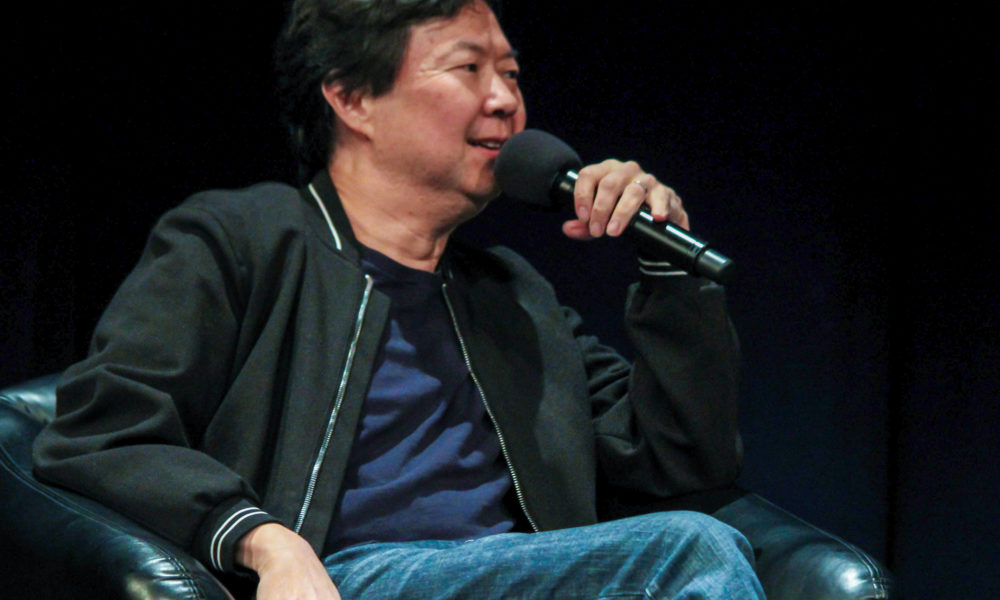Ken Jeong has had an unlikely career path, going from a doctor who did stand up comedy on the side, to breaking into film at the ripe old age of 39 to becoming one of the most respectable and recognizable comedians today.
Jeong spoke at Long Beach State for the latest “An Evening With” event presented by Associated Students Inc. Jeong spoke to a nearly sold out Carpenter Performing Arts Center Tuesday night.
He took the stage dressed casually in well worn blue jeans, sockless camo running shoes and a plain black jacket. Despite his plain dress, Jeong’s confident swagger and charismatic confidence were unmistakably that of a movie star drawing thunderous applause from the packed theatre.
Jeong dramatically motioned for the audience to be even louder, standing on one foot and cupping his ear. The students were more than happy to oblige.
“An Evening With” started off firmly in Jeong’s comedic comfort zone with him comedically riffing off questions much to the delight of the audience before pivoting to the more serious topic of the lack of Asian representation in film.
Jeong’s family was always focused on education, and pressured him to excel in school.
“I was ‘Koreaned’ into med school in utero,” he said.
During his residency in New Orleans, Jeong began his career in comedy, doing stand up shows and it’s also where he met his wife, Tran Ho.
“She’s my best friend, confidant, therapist,” he said, pausing and adding lasciviously ,“Lover.”
Jeong’s new Netflix special is called “You Complete Me Ho,” inspired by his wife.
“I’ve been pimping that joke for years,” he said. “And pimping is easy.”
Growing up in a time when Asian representation in film was limited to Pat Morita’s role on “Karate Kid,” film didn’t seem like a possibility for Jeong. This, in conjunction with his family’s laser focus on education and the medical field, made acting something that Jeong did not pursue until much later in his life.
When Jeong approached his father about becoming an actor in college, his father asked him if he was mature enough to face rejection and if he thought that he could find work in Hollywood as a Korean.
“I didn’t have an answer for that,” Jeong said.
The scant few parts available for Asian men in Hollywood were unfulfilling and often played into stereotypes like “Asian Assassin number eight.”
“It was very depressing, reading for shitty roles and not getting them,” Jeong said.
Jeong’s big break was his role as Leslie Chow in “The Hangover.” His role embodied a villain that speaks in such an exaggerated Asian accent that he feels like a remnant of yellow face films of the 50s and 60s.
Jeong views the role as empowering rather than damaging.
“I played into the stereotypes so hard that I shattered them,” Jeong said.
Senior communication studies major Phil Lam agreed with Jeong.
“Being typecast, there are always people saying ‘he can’t do that,’” Lam said. “In terms of [Asian] representation, he’s the guy who figured it out.”
That isn’t to say that there wasn’t pushback about the role, and Jeong’s career as a whole.
“Comedy is subjective,” Jeong said. “Nothing is 100% fresh on Rotten Tomatoes.”
Jeong dubbed one group of people unimpressed with his work his “Asian haters.” They are other Asians who dislike how he represents the community.
“Ultimately we all want the same thing,” he said explaining that the difference is in their methods for introducing inclusion to Hollywood.
This inclusion is important to Jeong, and according to him is becoming more prominent. He mentioned the critically and financially successful film “Crazy Rich Asians,” which Jeong appeared in, as an example of this inclusivity.
“You don’t want to be the only Asian in the room, in the business,” he said. “You want people to choose from, so that the burden of our representation doesn’t fall on narrow shoulders.”




